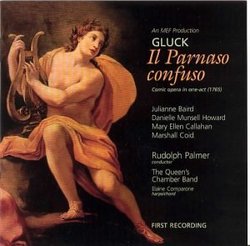| All Artists: Christoph Willibald Gluck, Rudolph Palmer, Queen's Chamber Band, Elaine Comparone, Danielle Munsell Howard, Julianne Baird, Marshall Coid, Mary Ellen Callahan Title: Gluck: Il Parnaso confuso Members Wishing: 0 Total Copies: 0 Label: Albany Records Release Date: 3/30/2004 Genre: Classical Styles: Opera & Classical Vocal, Historical Periods, Classical (c.1770-1830) Number of Discs: 1 SwapaCD Credits: 1 UPC: 034061065524 |
Search - Christoph Willibald Gluck, Rudolph Palmer, Queen's Chamber Band :: Gluck: Il Parnaso confuso
 | Christoph Willibald Gluck, Rudolph Palmer, Queen's Chamber Band Gluck: Il Parnaso confuso Genre: Classical |
Larger Image |
CD Details |
CD ReviewsNeither a first rate nor a first recording! Frederic Bourgeois | Palo Alto, CA | 10/01/2004 (3 out of 5 stars) "'Il Parnaso confuso' is a master piece from a composer who would soon become the reformer of the european opera. That comic opera shows how Gluck mastered the genres of operatic expressions: "seria" in the aria 'In un mar', "buffa" in the finale, or "pastorale" in the aria 'Fin la dove l'aurora' with its beautiful oboe solo. Apart from the astounding interpretation of the aria 'Di questa cetra in seno' by Cecilia Bartoli, that opera was recorded twice. The present Cd is the latest. In 2002, Agora musica released the truly "First recording" played on original instruments by the ensemble Musicanto. The singers of both versions show good skills but no more than good, except for the two "Eratos" who are terrible...Musicanto does a better job at accompanying the voices than The Queen's Chamber Band. Could it be because of the smoothness of the period instruments? A last word on the sound: the continuo instruments are clearly defined and very present, the rest of the orchestra seems to be distant with a slightly blurring reverberation. In a word, if you can get a copy of the Agora recording, go for it. If not, well, you may want to buy the Albany version, waiting hopefully for a better one." A Comic Opera by Gluck J Scott Morrison | Middlebury VT, USA | 05/18/2004 (4 out of 5 stars) "'Il Parnaso confuso' ('Parnassus in Disarray') was composed by Gluck in 1765 to celebrate the wedding of Austrian Empress Maria Theresa's eldest son, Archduke Joseph. It was for a private performance at Schönbrunn Castle in Vienna and members of the Habsburg royal family had prominent parts in the production. Maria Theresa's son Leopold was the conductor and the four solo parts were sung by four of her daughters - Maria Elisabeth, Maria Amalia, Maria Josepha and Maria Carolina - who must have been excellent singers considering that their parts have quite florid writing. The trivial plot, such as it is, is set on Mount Parnassus and is peopled by Gods and Muses. It seems allegorically to celebrate the marriage of Archduke Joseph (Giuseppe) and his Bavarian bride, yet another Maria Josepha, referred to in the Italian libretto as 'stella bavara' ('Bavarian star'). There are four treble roles: Melpomene (soprano Julianne Baird), Apollo (soprano Danielle Munsell Howard), Euterpe (soprano Mary Ellen Callahan), and Erato (countertenor Marshall Coid). Rudolph Palmer conducts the New York ensemble, The Queen's Chamber Band, a group founded by Elaine Comparone, the noted harpsichordist who plays continuo here. The piece, lasting about 72 minutes, consists of a Sinfonia (overture), recitatives, six arias and a finale. Melpomene and Apollo each have two arias, the other principals one each. By far the most outstanding performance here is that of Julianne Baird, whose creamily beautiful singing is certainly well-known and admired. Her opening aria, 'In un mar,' is a showpiece of spirited coloratura. Her farewell lament, 'Sacre piante,' a bit ironic in tone, is nonetheless moving and hauntingly sung. The other two female singers are just a notch below Baird in skill and artistry. Howard's Apollo has a light lyric soprano and substantial technique. Callahan's voice is similar to Howard's and she has a marvelous trill. Her 'Fin là dove l'aurora' is a lovely song to the Dawn. The only weak link here is the countertenor, Marshall Coid, whose tone is pleasant but whose technique is not quite up to the coloratura required in his aria, 'Di questo in seno.' There is far too much smudging and approximation of pitch. The Queen's Band does a smashing job of accompanying the singers. 'Il Parnaso confuso' is not major Gluck, but this recording is its only recording ever, and it is not likely to be recorded again any time soon, so Gluck completists will want to snatch it up. The music itself is a kind of proto-Mozart and entirely pleasant of its kind. Scott Morrison"
|
